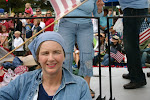Short Story Anthologies from Wapshott Press
"It started as a one-off idea," Mayerson says. "It turned out to be a fabulous idea."
"I got into publishing on a good deed,” she recalls. The good deed was triggered when Mayerson’s friend and fellow writer Anastasia Whitchhazel was very sick and very broke, and a publisher rejected her short story, “Chase,” after first accepting it.
“I couldn't do anything about her life, but I could certainly publish her story,” Mayerson remembers. She created Wapshott Press, and published Whitchhazel’s story in an anthology called Chase and Other Stories. She themed the collection around male homoerotica written by women.
As Tally Keller writes in the Chase introduction, “This erotica playfully thumbs its nose at conventional morality, tastefulness, and all other things proper young ladies are supposed to happily accept.” Mayerson likes to compare the collected stories to Annie Proulx’s “Brokeback Mountain.”
Three Chase stories began as unsold narratives for graphic novels: Witchhazel's title story, and two of Mayerson's own contributions, "Chiaroscuro" and "The Accompanist" (written under the pen name Amy Throck-Smythe). The latter was partly inspired by Mayerson's background in the world of chamber music.
After Chase came a follow-up collection, The Tagger and Other Stories. featuring more gay-themed short stories written by multiple authors and edited by Mayerson.
Like the debut collection, the stories in The Tagger varied widely in genre and sexual content. Most explicit--but also perhaps the most realistic--was Logan's "Fast Forward." If it were a movie, it'd likely be rated NC-17. It described a tragic life in the contemporary San Francisco gay scene, with cultural references to DVD rental stores and the Golden Gate bridge.
In contrast Chad Denton's "The Unsent Letter" was implicit, as much about what the author's letter didn't say as what it did.
Mayerson's contributions to the second anthology were also gritty realistic romances set in contemporary urban culture. She wrote the title "Tagger" story and "You Know You Should be a Better Person (but You're Not)," the latter written under a pen name. Both imparted the flavor of her Lincoln Heights neighborhood just outside of downtown Los Angeles, a place with its share of graffiti "taggers" and junkies, some of whom are gay.
Some other Tagger stories, including Laura Dearlove's "Across the Universe," represented a burgeoning sub-genre that crosses gay themes with fantasy and science fiction.
After the first two anthologies, Mayerson began Storylandia for short romantic literary work. The first seven issues were published between 2009 and 2012, and included much adult fantasy and science fiction.
Starting with the eighth Storylandia in 2013, Mayerson moved away from short story collections by multiple authors. Recent issues have contained single book-length works of genre fiction, but the door at Wapshott Press remains open to the possibility of a future collection of short stories by one author.


0 Comments:
Post a Comment
Subscribe to Post Comments [Atom]
<< Home